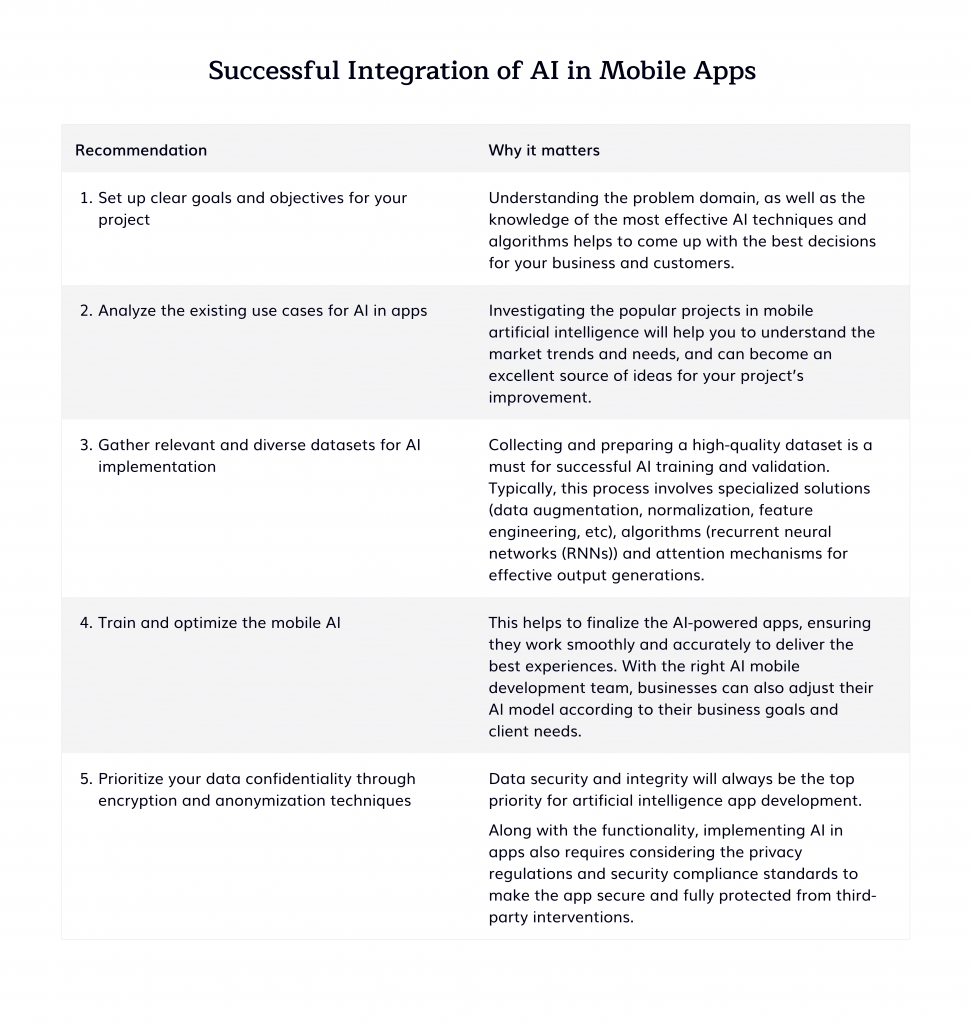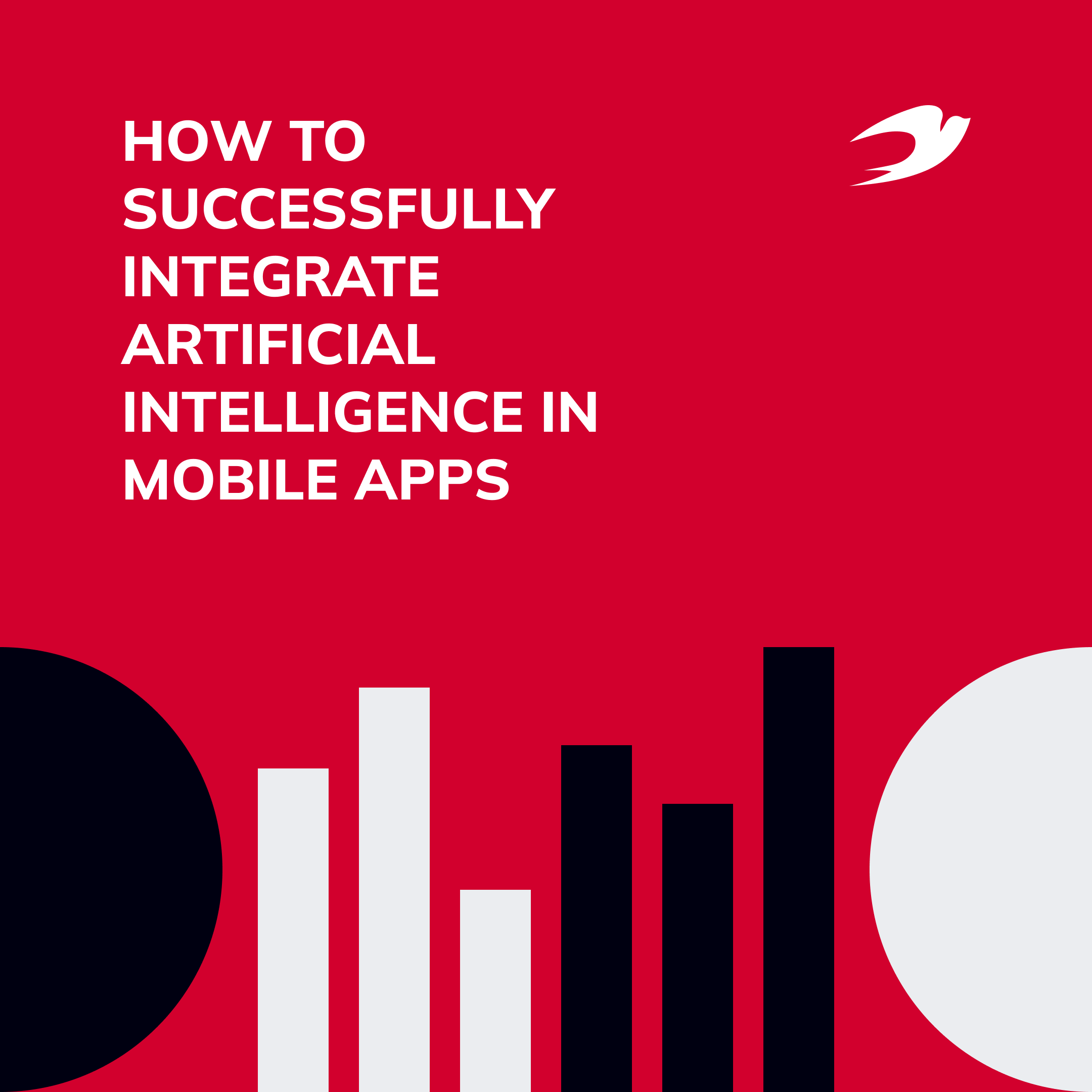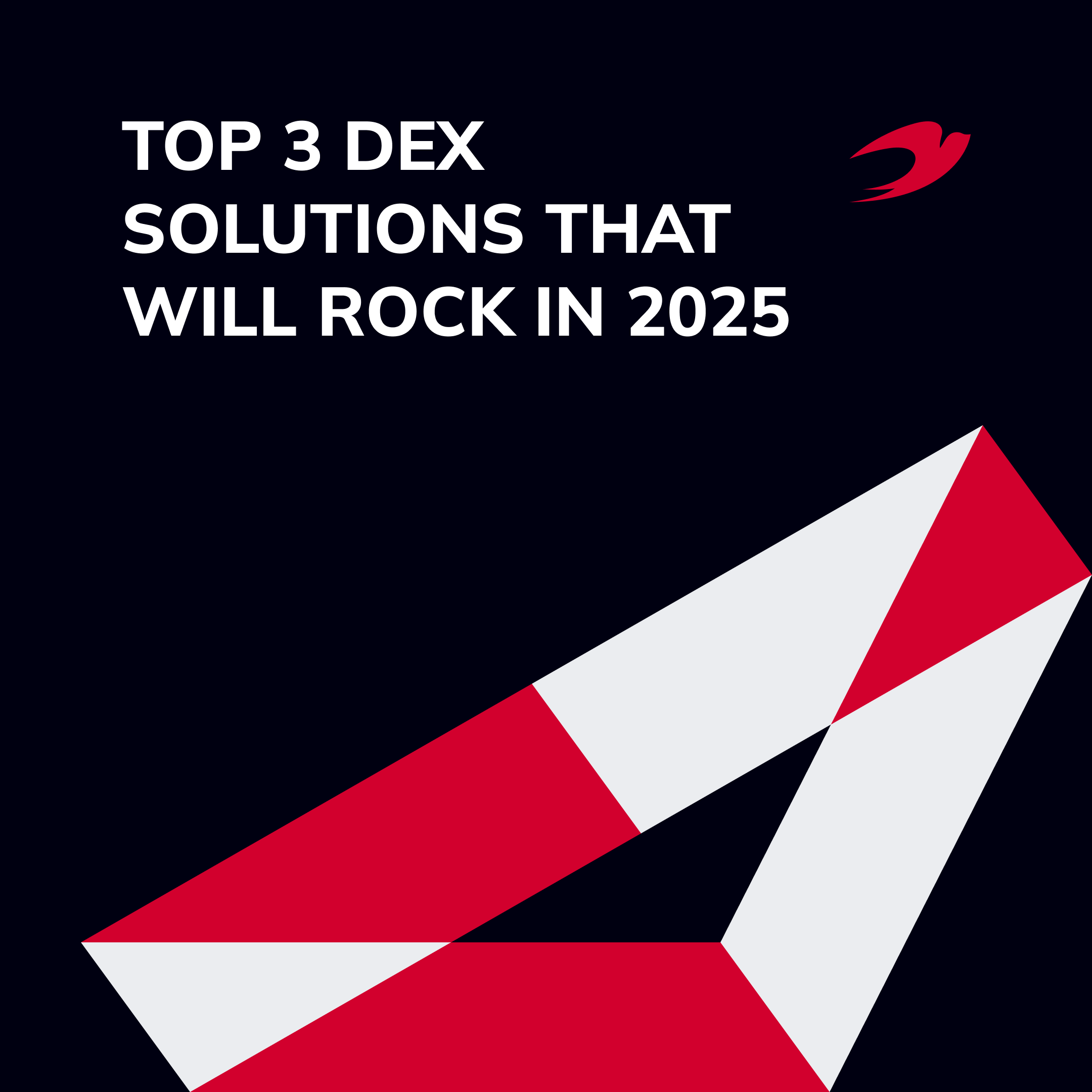As of present, the global trend of integrating AI in mobile apps is more popular than ever. Starting January 2023, both successful ventures and perspective startups start looking for innovative AI-powered tools to be integrated into existing and further projects, especially in mobile app development.
Harnessing the mobile AI solutions can not only enhance the product’s performance and deliver a better experience but also help to remain out of the competition. And that’s why we can see hundreds of companies investing in this perspective niche. In 2022, the global artificial intelligence market was valued at $119.78 billion, and is expected to hit the striking $1,591.03 billion by 2030!
So, the earlier you get into the mobile AI, the more profit your company wins.
In this article, IdeaSoft’s best AI developers will uncover the basics of embedding artificial intelligence in mobile applications to help you to come to a powerful solution for your business. We’ll analyze the successful examples of AI app development, useful tips, and potential challenges of AI integration and share our experience in mobile AI projects.
Table of content:
- AI in Mobile App Development in 2023
- Preparing for AI Integration in Mobile Development: Key Essentials
- Leveraging AI Techniques in Mobile App Development
- Key Challenges
- IdeaSoft Experience
- Summary
AI in Mobile App Development in 2023
With more and more progressive AI solutions emerging on the market, the potential of artificial intelligence seems to be untapped. In particular, mobile AI development has profound benefits from both company’s and customers’ perspectives. Some of the most essential include:
- Personalization & Forecasting. Mobile artificial intelligence enables personalized, user-centric experiences and provides predictive suggestions based on user data and behavior patterns.
- Engagement & Efficiency. Mobile AI analytics provides valuable business insights based on customer interaction, app performance, and market trends, which result in higher efficiency, open more perspectives for boosting product quality, and improve customer engagement.
- Automation & Cost Reduction. Machine learning (ML) algorithms automate tasks, streamline workflows, and optimize resource allocation. These allow companies to reduce operational costs and optimize their budgets.
Realizing the potential of artificial intelligence in mobile applications, it’s already been integrated into popular AI assistants, self-studying tools, and editing apps, such as Google Assistant, Amazon Alexa, ELSA Speak, Face App, and so much more. Also, there’s a common practice of leveraging mobile artificial intelligence in IoT (vehicle smart devices or smart home gadgets), which has revolutionized user experiences. For instance, Nexta’s dashcam app is an AI-powered vehicle-to-vehicle network that can timely identify the dangers on the road and provide «watch out» life-saving warnings.
Preparing for AI Integration in Mobile Development: Key Essentials
Planning is one of the most crucial stages of any project’s development. And, when it comes to artificial intelligence in mobile applications, a thorough preparation – from ideation to deployment – can either make or break your AI app dev project. Based on the extensive expertise in mobile artificial intelligence, the AI development team from IdeaSoft has outlined the essential aspects that work for every AI-based solution.

These are only a few core suggestions that can help you get ready to add AI to your application and maximize its performance to fully meet customer needs, business goals, and target market.
Leveraging AI Techniques in Mobile App Development
Without any doubt, AI and machine learning solutions will remain a long-term trend for mobile application development. So, once you decide to embed these solutions into your project, exploring the top techniques and practices in artificial intelligence app development will help to make the best decisions for your business.
Below are some of the most common AI and ML technologies that play a pivotal role in mobile application development.
Natural Language Processing (NLP)
NLP technology is fully focused on understanding and processing human language. For this reason, it is often used for building conversational interfaces, chatbots (for instance, projects with ChatGPT integration), voice recognition systems, and language translation functionalities within mobile apps.
By employing NLP, AI-powered apps can provide enhanced user interactions, offering seamless communication and improved accessibility to its functionality.
Machine Learning Algorithms
As you know, ML algorithms are at the core of AI-powered apps. They analyze big data to identify patterns, make predictions, and generate helpful insights.
In mobile app development, ML algorithms are used for user-based recommendations (for example, personalized content, product suggestions, and customized user experiences). With this technology on the board, AI apps can deliver tailored and relevant content, leading to increased user engagement and higher user experience.
Computer Vision
Computer Vision focuses on image and object recognition, enabling mobile apps to interpret and understand visual data. These qualities make it exceptionally important for the solutions like facial recognition, object detection, augmented reality, and image-based searching.
So far, this functionality has been integrated into plenty of AI mobile apps, ranging from virtual tr. When planning the AI integration project, you can consider popular options like TensorFlow, CoreML, PyTorch, ML Kit, Caffe, Keras, or else ask your AI developers to identify the most relevant option for your business needs.
Nevertheless, to identify which ones will be the most effective, we recommend getting a quote from your AI development vendor. At IdeaSoft, our team creates a custom strategy for AI integration that is fully tailored to the project’s specifications, desired features, and requirements. So, you can stay sure that every decision is aimed to maximize your project’s performance and will benefit its further growth.
Key Challenges in AI-Enabled Mobile App Development
Along with the immense potential of AI in mobile applications, business owners should also keep in the loop about the key challenges of artificial intelligence integration.
Data Quality and Availability Challenges
AI is heavily tailored to big data for training, testing, and optimization. So, ensuring data quality and availability can become a significant challenge for some businesses, as it is time-consuming and resource-intensive. Additionally, privacy concerns and data access restrictions can limit the availability of suitable data, which significantly impacts the performance of your AI-powered apps.
What is more, in one of the most recent interviews Jimmy Wales, the co-founder of Wikipedia, raised the question of the data quality in one of the world’s most popular AI assistants – ChatGPT-4. While testing, he noticed that the answer to his query was not based on real-case examples, generating only general thoughts on the topic. Jimmy Wales also said: “In three to five years, I’m hoping we’ll see a much higher level of accuracy when you ask a [more specific] question instead of being quite so eager to please by giving you a plausible-sounding answer with the generated text.”
With this said, when applying AI to build mobile apps, developers must integrate only high-quality and diverse datasets that accurately represent real-world scenarios.
Computational and Resource Limitations
Another quite popular technical challenge to deal with in AI mobile app dev is the computational and resource limitations. AI algorithms, especially complex ones like deep learning, require considerable computational capacities.
Mobile devices often have limited processing power, memory, and battery life, which doesn’t always fit the resource-intensive AI models. That is why, AI developers need to find the golden balance between powerful AI capabilities and the constraints of mobile hardware to come up with the best solution for your project.
Integration Complexity
Using AI to develop apps requires expertise in its core technologies and a solid experience in AI integration with app frameworks. Developers need to ensure smooth interoperability and seamless performance between AI components (libraries, algorithms, AI models, etc) and the app’s core features, which may require additional effort and expertise.
However, IdeaSoft’s AI specialists agree, that this challenge can be easily resolved with a thoroughly planned strategy and the right AI expertise involved.
User Experience & App Functionality
Along with the tech challenges in AI mobile development, another essential factor to consider is the way you introduce AI-based app features to your customers. To fully harness the power of AI, it’s essential to ensure the seamless and stable performance of your app without sacrificing its transparency and accuracy.
At the same time, for the best user experience, developers also need to ensure the app’s features are fully accessible and understandable to each user.
Ethical and Legal Considerations
The hype around generative AI technologies has reportedly resulted in lots of genuine disinformation and misinformation, which have already become a serious issue for social media platforms.
“It is also believed that AI can be potentially used to perform more serious things, such as the creation of misinformation on social networks or faking user IDs” says Anna Dereka, Head of Business Analysis at IdeaSoft.
For instance, Binance’s chief security officer claimed that AI deep fakes are getting better spoofing at the KYC process to create an account on the exchange. In the upcoming years, this problem can potentially hit other industries as well, creating new challenges for AI architects and development specialists.
For this reason, AI-enabled mobile apps must comply with ethical and legal guidelines. Issues such as data inaccuracy in AI algorithms, data privacy, and security, and compliance with regulations like GDPR or HIPAA pose challenges that developers must address. So, while using AI to build mobile apps, make sure to mind the ethical use of AI, user data protection, and regulatory compliance.
Ideasoft Experience in AI App Development for Mobile
IdeaSoft team has dozens of successful AI projects across multiple industries, from popular in mobile and web development to more specific, such as fintech and agriculture. Below are some of our most recent AI dev projects that will help you explore our expertise in more detail.
- Nexar dashcam app – the AI and ML-based solution designed to predict dangerous situations on the road. This cross-platform safe-driving application helps users to react to ever-changing road updates instantly, collect necessary data for insurance companies, and so on. The AI functionality helps to analyze the dashcam data in real-time and provides data-driven, helpful suggestions for drivers.
- Neura customer engagement platform – this universal ecosystem has been created to enhance customer services in multiple industry domains, including healthcare, logistics and transportation, fintech, and many more. The AI and machine learning technologies integrated into the app allow to collect and analyze user data, to get real-world insights and advanced predictions aimed to improve customer engagement.
- Agrieye farming service – this AI and machine learning web services are designed to increase the effectiveness of farming and gain valuable insights on future yield, planting, nutrition, and crop protection solutions. The service collects data in real-time from AI-based drones and, with the help of ML technologies, provides the most effective suggestions for farming businesses.
Along with the AI solutions, our team has been also actively working in blockchain, UI/UX design, front-end and back-end development, digital product design and branding, technical support and so more. Check our portfolio to get more ideas for your upcoming mobile app project!
Summary
There are multiple strategies and ways to implement AI in mobile apps, which can give a huge boost to your project’s performance and further business growth. With machine learning, natural language processing, and computer-powered solutions onboarded, your AI mobile app can provide the best user experiences, task automation, powerful analytics, and data-driven decisions. Perfectly integrated with the right tech solutions, these are sure to help your project to succeed.
If you’re planning to integrate AI into your mobile app and are looking for a trusted AI development vendor – IdeaSoft’s top AI experts are here to help. Our extensive expertise in AI mobile development and hundreds of successful cases across different domains helps us to resolve various challenges in app development.
Contact our experts to get started on your custom AI app development for mobile today!




